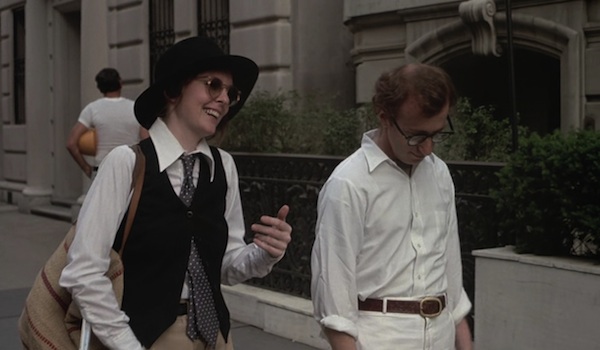Annie Hall Review
“Annie Hall†was the beginning of Woody Allen as most know him. It marked the beginning of a career transition that moved him from pure comedy to the realistic romantic dramedy – the genre he’s most closely associated with. Part of the reason he is so well-known for it is because of “Annie Hall,†a triumph on almost every level. The comedy is gold. The acting is great. And the writing is sharp and down-to-earth. Looking at the film now, it might seem like typical Allen, but there’s definitely something special to it – something the great director hasn’t quite capture since.
The plot’s not intricate. It’s a story of man meets girl, man falls in love, man loses girl, man gets girl back, man loses girl again, man crushes spider with tennis racket and wins girl back, man is animated, man goes to therapy, etc. The Woody Allen-style romance is almost a genre in and of itself. But for possible newcomers’ sake, Alvy Singer (Allen) is a neurotic New York comedian. The actor breaks the fourth wall and explains directly to the audience that he has separated from his longtime girlfriend Annie Hall (Diane Keaton). Through flashbacks, we then see the best of times and the worst of times for Alvy and Annie, from their delightful meet at the tennis court to their frequent fights and breakups.
One of the things that makes “Annie Hall†so unique is the stylistic quirks Allen employs. He animates a brief scene. He always breaks the fourth wall (although that’s not totally unique to this film, it works better here than in, say, Whatever Works). He often steps out of body to observe his or Annie’s younger self. And in one scene, he brings in scholar Marshall McLuhan to prove a point to an obnoxious moviegoer (one of the film’s funniest scenes). But the best thing about these quirks is that they are used with a purpose. They stress a point, advance the plot, or increase the quotient of laughs.
In terms of acting, “Annie Hall†is top-notch. This is the probably one of Allen’s least annoying performances. People ride him a lot for his acting and inability to inhabit someone who isn’t obnoxious and neurotic. Here, he’s not bothersome; He’s actually a little endearing. Diane Keaton, of course, is luminescent. During the scene in which she has her big singing breakthrough, it’s impossible to take your eyes off of her. She deservedly won an Oscar for her work here, and when her career is over, I’d wager this is the role she’s remembered for.
“Annie Hall†also features one of the tightest and most honest screenplays of its time. It doesn’t shy away from some of the messy details of Alvy and Annie’s relationship, yet it still maintains an overall tone of playfulness. Allen’s over great feature from this time is Manhattan. The two are thematically quite similar, but the tones are almost completely different. If pressed, I’d say I prefer Manhattan, but that’s mostly because of the gorgeous photography and music. I actually think “Annie Hall†has the better script, and a more enjoyable feel to it.
The film won Best Picture and Best Director in 1977, which cemented its place in history. In the thirty-plus years since, Allen’s films have surpassed (or even come close to for that matter) this maybe twice. Allen certainly is an acquired taste for many, but if you are still skeptical of his talents, I recommend checking this one out. It’s much more mainstream than some of his other fare. It’s short. And watching Diane Keaton in the title role is well-worth 90 minutes of your time.















